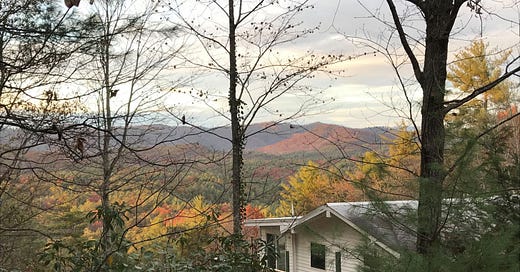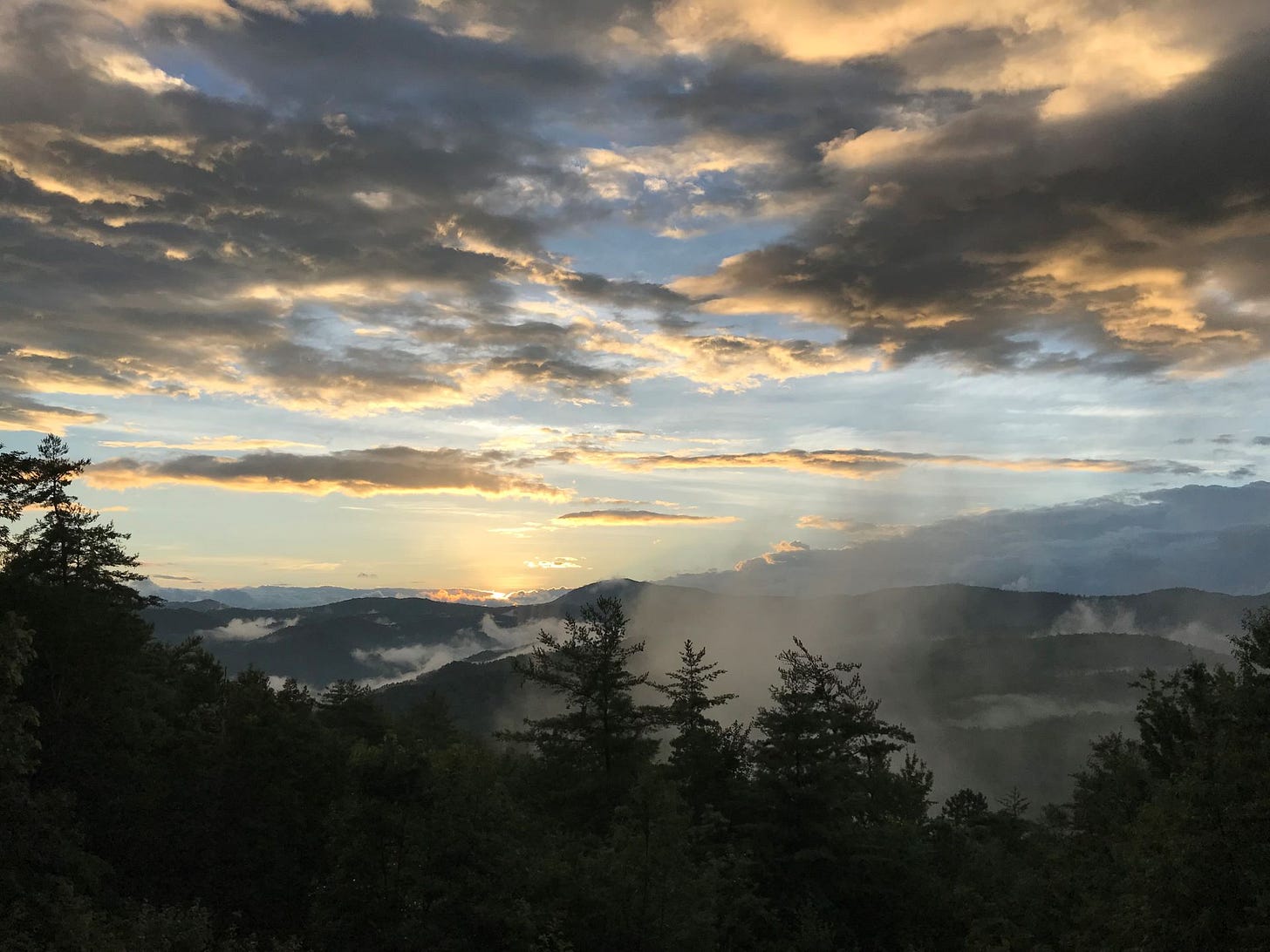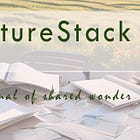Nature writer, n. A person who delights in paying attention, being astonished, and telling about it.1
“I’m convinced that our lost connection with the larger, non-human community of life on Earth is the primary cause of all the destruction facing the planet and humanity. Grokking on a deep, gut level that we are connected with everything else on Earth—and frankly, everything in the Cosmos—quickly sorts out our priorities and relationships to show us what matters most. ” ~ Marsha Stopa
My inbox is full of treasure in the form of lovingly observed writing about place, encounters both wild and gentle, imaginative kinship and renewed reciprocity. These thoughtful, talented writers kindled in me the desire to learn more about them.
Today’s guest,
, is a writer and coach dedicated to reconnecting people with Nature. On the About page of her Substack, Essential Nature, Marsha makes a fascinating case for what she calls The Nature Response. Our tech-addled and attention-fatigued brains need a reset. Fortunately, we can be restored to better physical, emotional, mental, and psychological health by being in nature. The best part? Anyone can do it, and Marsha provides tips and encouragement.I first encountered Marsha through posts like this one: What if you could design a life you don’t need to escape? She relocated from a fast-paced city life to the peaceful mountains—and recently suffered the calamity of Hurricane Helène’s deluge. Her community was spared the worst of the mudslides and floods, but downed trees wreaked their own havoc with a two-week power outage. Her most recent post opens with a stunning aurora-fest and continues with sobering reflections on vulnerability and resilience.
Why are you drawn to nature writing?
The more relevant question might be why Nature writing is drawn to me, one of the least likely people you’d expect to be questioning our relationship with Nature. A Detroit native, I had limited time outdoors as a kid in a family that never ventured off paved roads. I became more adventurous as a young adult, taking a hiking class with my husband and attempting a few backpacking hikes. After my divorce I spent weeks alone over many years at a friend’s cottage on the Muskegon River, detoxing from a stressful journalism job.
Always someone who processed change through words, Nature writing was an inevitable outgrowth of my move to the Blue Ridge Mountains in Western North Carolina, especially after I bought six acres on a forested mountain ridge in an isolated community next to the wilderness in 2017. Being alone with so many trees exploded the reconnection to Nature that had grown and stalled over the years.
Realizing I was still too plugged into screens despite the Nature around—and calling—me, I quit Facebook cold turkey a month before the 2020 election. I was finally able to shift my focus, open my attention, tune into the peace surrounding me and start to listen to Nature on a different level.
How does writing about nature affect you, in your work or personal life?
Nature writing has revealed to me what I believe is my sacred purpose: To reconnect people with Nature.
I’m convinced that our lost connection with the larger, non-human community of life on Earth is the primary cause of all the destruction facing the planet and humanity. Grokking on a deep, gut level that we are connected with everything else on Earth—and frankly, everything in the Cosmos—quickly sorts out our priorities and relationships to show us what matters most.
And it’s clearly not what we’ve been focusing on.
That’s why I capitalize Nature: To shift the conversation to how we’re treating the most marginalized and abused living community on Earth and begin to give Nature the respect they deserve.
I’ve been taking a course in Nature-connected coaching and my intent is to offer meditations, workshops and coaching to the community I’m building around Essential Nature.
For me, it all begins and ends with the trees.
I’m surrounded by and immersed in thousands of acres of trees. Trees have become my guides and teachers. The more I learn about trees the more I become obsessed with trees. We know so little about and can learn so much from the trees that blanket this planet.
While outside, have you ever experienced feeling small, lost or in danger?
Two experiences come to mind, both since I moved to the mountains.
The first was 10 years ago, right after burying Luna, a spitfire of an older cat, near my rental house. As I walked away from her grave and gazed at the distant ridges, I was jolted by a sense of how tiny and insignificant her little body was in the vast mountains, and at the same time, how she was at home.
That shift in perspective helped reframe her passage out of my life into the larger living world.
Two years ago I attempted to cut a trail through the rhododendron thickets in my forest and got so disoriented I mistook glimpses of my own home for a mysterious cottage hidden in the forest I had never seen before. My panic happened so quickly—and so close to home—I finally understood how hikers can get lost if they’re not paying attention to the signs all around them.
What’s a favorite memory of nature from your childhood?
I became mesmerized with Nature one summer when I went out into my parents’ postage-stamp backyard in Detroit, flopped down on the grass and began studying what was happening in a tiny patch of grass. Always a nerd, I was doing the exercises in a Nature-focused science workbook I bought. I was stunned to see the number and variety of insects and their activity in such a tiny area and it forever changed how I looked at Nature.
What do you hope for, for your writing?
Ultimately I want my writing to be so powerful it reconnects people with Nature and helps them understand what’s been missing from their life and the world.
I’m early in my explorations. There are many eloquent writers on Substack who have read more and formed deeply thoughtful opinions that I'm inspired by what they show me.
When I first started writing I wanted to be thought provoking, but I realized that being merely thought-provoking doesn’t necessarily help someone change their mind, actions or life. Telling readers, for example, all the evidence-based reasons why they should unplug from screens (my first posts) didn’t make many people unplug, although it may have made them feel guilty.
Now, I’m focusing on triggering emotions with stories to give readers a new experience with Nature that rekindles their connection. I believe it’s the storytellers who will awaken humanity.
I named my publication Essential Nature precisely for the double meaning inherent in the name: to call out that Nature is essential to life on Earth and also part of our essence as humans. We can’t deny Nature—Nature is in our DNA.
A writer or other creative artist who makes you hopeful for humanity and the earth.
My interest in Nature writing was piqued seven years ago by the books of British author Robert Macfarlane, who weaves together human and natural history with a deep curiosity and awe of Nature. I could feel the landscapes he walked while I marveled at the poetry of his prose.
I’m a latecomer to the work of botanist and author Robin Wall Kimmerer, who is educating me on many things with Braiding Sweetgrass. She gives me hope.
Reading Ishmael by Daniel Quinn was a profound experience, like sharpening the focus on a telescope that looks back in time. Quinn’s explanation of how the dawn of agriculture fostered our disconnection from Nature gave me a new framework to test my feelings and observations. Spoiler alert (but still read the mind-bending book): The solution: “Make space for Nature.”
If you enjoyed this post, a lovely ❤️ keeps me going. Another way to show love is to share this post with others by restacking it on Notes, via the Substack app. Thanks!
For more inspired nature writing and artwork from the best of Substack, check out the articles in NatureStack journal.
In further service to Substack’s nature writers,
curates this lovely directory of nature-focused writers:thanks, Mary Oliver











What a beautiful love letter to Nature.
Thank you Julie, for this interview series!